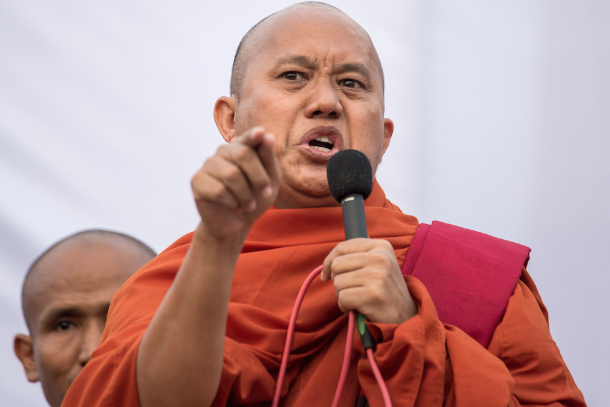Ultra-nationalist monk seeks to make a political comeback by championing the armed forces

John Zaw, Mandalay , Myanmar, May 15, 2019
Ultra-nationalist Myanmar monk Ashin Wirathu has told a rally of hard-line nationalists that military officers sitting in parliament should be worshipped like God.
On the morning of May 5, hundreds of people joined a pro-military rally in front of the city hall in Yangon, the former capital and now a commercial hub.
“Nowadays, military lawmakers sit in a parliament, but they don’t get salaries as a lawmaker. They only get the salaries of soldiers. They protect the country while taking only a soldier’s salary, so they should be worshipped like God,” Wirathu said at the event in a video made by local media Khinthitnews and posted on Facebook.
“But people now hate them like enemies. Under those circumstances, it’s not possible to amend the constitution.”
Wirathu opposed any change to Myanmar’s military drafted constitution barring the country’s de facto political leader, Aung SanSuu Kyi, who uses the title State Counsellor, from ever becoming the nation’s president because she previously married a foreigner.
Her British husband, Michael Aris, died in 1999.
Since January, nationalists have held a series of pro-military rallies in an effort to counter grassroots demonstrations in several cities, including Yangon and Mandalay, in favor of constitutional change.
Parliament in January approved the establishment of a 45-member committee led by Suu Kyi’s National League for Democracy (NLD) tasked with mapping out constitutional reforms.
Of particular concern to pro-democracy campaigners is a provision that grants military MPs the power to veto any proposed charter changes, notably any amendments that would curb their political power.
The 2008 charter mandates that a quarter of all parliamentary seats be reserved for the military. It also gives them control of key portfolios such as home affairs, national defense and border security.
Military chief Min Aung Hlaing has told Japanese newspaper Asahi Shimbun the military accepts that the constitution needs amendments. “But the important thing is that no amendment should harm its essence,” he said.
Pro-military stance
Wirathu, referred to by some as the ‘Burmese Bin Laden’, has made a return to public life, including through publicly supporting military generals accused of genocide over a brutal crackdown on Rohingya Muslims in Rakhine State.
He was barred in March 2017 from giving sermons for a year by the State Sangha Committee, which oversees the practice of Buddhism, for engaging in religious hate speech.
Wirathu’s historic brand of extreme Buddhist nationalism and anti-Muslim rhetoric is seen my some as a growing force in Myanmar society where the Buddhist majority hold monks in high regard.
His anti-Muslim rhetoric fueled communal riots in 2013 and 2014.
However, his rhetoric has shifted more recently from espousing anti-Muslim sentiments to emphasizing a pro-military stance and criticizing Aung San Suu Kyi and her government’s performance.
Khin Zaw Win, director of the Tampadipa Institute, a Yangon-based think tank, said nationalists are seeking to regain the status they enjoyed under former president Thein Sein by holding pro-military rallies.
He also notes that Wirathu now focuses on politics rather than religious hate speech.
Khin Zaw Win told ucanews.com that senior Myanmar monks should not remain “silent” over Wirathu’s extreme-nationalist politicking.
Ashin Ariya Wun Tha Bhiwun Sa, a Buddhist monk from Mandalay, said he is not concerned with the nationalist-led rallies as they don’t have a clear agenda and lack grassroots support.
Nonetheless, the monk, who is involved in interfaith activities, said that Wirathu is tarnishing the image of Buddhism and undermining the role of fellow monks.
Wirathu had been “used” by political opportunists, Ashin Bhiwan Sa told ucanews.com.
He questioned why authorities had shown bias by approving the holding of what he described as “nationalist-led” rallies.
“Wirathu has strong backing and he is doing what he wants,” the monk complained.
The minister responsible for Myanmar’s religious and cultural affairs told local media representatives recently that officials are gathering evidence to file a lawsuit against Wirathu for speeches attacking Suu Kyi.
On May 3, Thai authorities banned a sermon by Wirathu, planned to be delivered on the southern tourist island of Phuket, amid concern it could exacerbate religious tensions.
Wirathu is the vice-chair of a Buddhist nationalist group, the Committee for the Protection of Race and Religion known as ‘Ma Ba Tha’ which spearheaded much of the anti-Muslim rhetoric that has fueled sectarian conflicts, particularly in western Rakhine State.
Violence there in 2012 left more than 200 people dead and forced tens of thousands — mostly Rohingya Muslims — to flee their homes.
President Thein Sein, despite being backed by Ma Ba Tha, was trounced in 2015 elections by Suu Kyi’s NLD.
Kyaw Nyein, a Yangon-based lawyer, is also unhappy that nationalists now easily get permission to hold demonstrations even in the downtown area of Yangon.
But he too does not think the ultra-nationalists have widespread public support.
Suu Kyi’s government and the military have been facing pressure from the international community over the military’s bloody crackdown that led to more than 700,000 Rohingya Muslims fleeing to Bangladesh.
